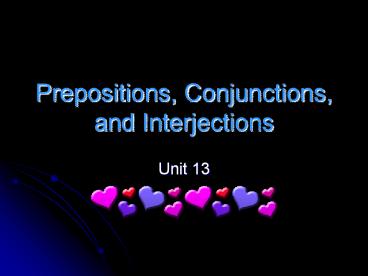Prepositions, Conjunctions, and Interjections - PowerPoint PPT Presentation
Title:
Prepositions, Conjunctions, and Interjections
Description:
Prepositions, Conjunctions, and Interjections Unit 13 Prepositions A preposition is a word that relates a noun or a pronoun to some word in a sentence. – PowerPoint PPT presentation
Number of Views:603
Avg rating:5.0/5.0
Title: Prepositions, Conjunctions, and Interjections
1
Prepositions, Conjunctions, and Interjections
- Unit 13
2
Prepositions
- A preposition is a word that relates a noun or a
pronoun to some word in a sentence. - The paint on the canvas will dry slowly.
- He ran down the stairs.
- The dog hid under the bed.
3
Prepositions
- A prepositional phrase is a group of words that
begins with a preposition and ends with a noun or
pronoun, which is called the object of the
phrase. - The dog hid under the bed.
- Sit beside me.
- The runners sprinted across the finish line.
4
Prepositional Phrases
- The noun or pronoun that ends a prepositional
phrase is called the OBJECT. - He was born in a small town.
- The cat ran toward the litter box.
- The bridge is over a river.
5
Prepositional Phrases
- The object of the phrase should be an object
pronoun and NOT a subject pronoun. You would not
use he, she, we, or I. - Hand the box to ( me, I).
- She ran towards (he, him).
- I cant sit beside (she, her).
6
Prepositional Phrases
- Sometimes an object will be compound. Remember to
use an object pronoun. - Give it to Gary and (I, me.)
- I lent a book to Nick and (she, her).
7
Prepositions
- Sometimes prepositions can be made up of two or
more words. These are called compound
prepositions. - according to aside from in front of instead of
- across from because of in place of on top of
- on account of along with far from in spite of
8
Prepositional Phrases
- If you are unsure about whether to use a subject
pronoun or an object pronoun, try saying the
sentence aloud with only the pronoun following
the preposition. - The subject pronoun who is NEVER the object of a
prepositional phrase. - ONLY use whom as the object.
9
Jobs of Prepositional Phrases
- A prepositional phrase can function as an
ADJECTIVE by describing a noun or pronoun. - The phrase will almost always come directly after
the noun or pronoun that it is describing. - The fabrics from the Orient are beautiful.
- (from the Orient describes fabrics)
- The man in the blue suit is staring at us.
- (in the blue suit describes man)
10
Jobs of Prepositional Phrases
- A prepositional phrase can also function as an
ADVERB when it modifies or describes a verb, an
adjective, or another adverb. - An ADVERB phrase tells when, where, or how an
action takes place. - It usually will go to the verb.
11
Adverb Prepositional Phrases
- The women are weaving on looms.
- (on looms goes to weaving)
- That fabric looks great on you.
- (on you goes to great)
- They work in shops.
- (in shops goes to work)
12
Are these adjective or adverb phrases?
- Weavers around the world practice an ancient
craft. - Early weavers worked with long grass strands.
- Paintings from ancient Egypt show that weaving
was developed early. - Tapestries with complex patterns hang in museums.
- These tapestries often illustrate stories about
great people. - Many tapestries depict stories from the Bible.
- Several tapestries hang in French museums.
13
Conjunctions
- There are 2 types of conjunctions-words that
join. - 1. Coordinating - and, but, or, so, yet, for
and nor. - 2. Correlative (pairs) - both/and
- either/or
- neither/nor
- not only/ but also
14
The s rule AGAIN!!!
- Remember when using conjunctions
- Singular subjects have verbs that end in-s
- Plural subjects do NOT have verbs that end in -s
15
Conjunctive Adverbs
- A conjunctive adverb may be used to join the
simple sentences in a compound sentence. - Conjunctive Adverbs replace conjunctions to add a
little flair to your speaking and writing. - Many Asians use chopsticks, but some use forks.
- Many Asians use chopsticks however, some use
forks.
16
Conjunctive Adverbs
- Conjunctive Adverbs replace conjunctions to add a
little flair to your speaking and writing. - To replace AND --- also, besides, furthermore,
moreover - To replace BUT --- however, nevertheless, still
- To state a result consequently, therefore, so,
thus - To state equality equally, likewise, similarly
17
Conjunctive Adverbs
- Look closely as to how these adverbs are
punctuated in a sentence. - Chinese cooks often stir-fry their food
therefore, they must cut it into small pieces. - When 2 simple sentences are joined with a CA, a
semicolon always appears before the second
sentence.
18
Conjunctive Adverbs
- When the CA comes at the beginning or end of a
sentence, it is set of by a comma. - Stir frying should be done quickly the wok must
be very hot, therefore.
19
Conjunctive Adverbs
- When the CA appears in the middle, one comma
precedes it and one comma follows it. - Vegetables cook more quickly than meat they
must, therefore, be added to the wok last.
20
Interjections
- An interjection is a word or group of words that
expresses a strong feeling. - It has no other connection to any other words in
the sentence. - Aha! Oops well Awesome
- Oh my! Oh my goodness, ouch, ha, wow, gee
whiz, hooray, whoops, what - Good grief Holy Moley Gosh
21
Interjection
- Interjections that express STRONG emotion are
followed by a ! - Overusing interjections will spoil their
effectiveness. - Wow! The Saints just won the Superbowl.































